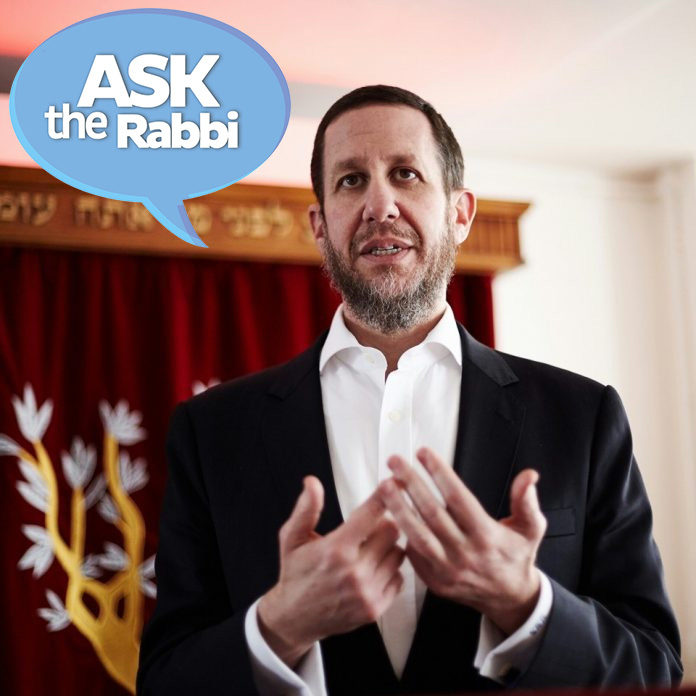
IN MY OPINION
Dear Rabbi,
“I have read many of your remarks about Israel which I vehemently disagree with. Did you know that your comments last week, using the analogy of the fly in the coffee was especially upsetting. In my opinion, your views about Israel are wrong and you would be better off just not sharing them with readers.”
Salomon
Dear Salomon,
“Did you know that if you close your mouth, you can actually shut up and not give your opinion that no one asked for. Crazy how the human body works. Thanks for writing in.”
A SKY HIGH QUESTION
Dear Rabbi,
“What happens if I left my tallit in my car before Shabbat which I now need on Shabbat. Am I allowed to ask a non-Jew to open the car and retrieve it for me?”
GIVUC
Dear GIVUC,
“For the benefit of readers, your name stands for Guy In Virgin Upper Class. That’s right – last week I was returning from 36 hours in Florida where I was lecturing, and you’re the guy who kept looking at me every time I got out of my seat (talk about feeling a little uncomfortable). Until just an hour before landing when you blurted out, “Ask the Rabbi! I knew I recognised you from somewhere!” I guess one can run but can’t hide! Well, I invited you to ask a question though didn’t quite expect such a halachic one. So here goes:
Generally, asking a non-Jew to do a forbidden Shabbat activity on your behalf on Shabbat, is forbidden. There are a few explanations for this, but at a basic level, it would otherwise demean the broader sanctity of Shabbat.
According to several opinions, in principle, it would be permissible to open a car door and go into a car on Shabbat, if this would not activate lights or an alarm. Since the door is not moved from one point to another, but merely swings around hinges, this does not violate the prohibition of muktsa.
Nevertheless, going into one’s car is forbidden for “mar’is ayin” – arousing suspicion. People who see an individual going into his car on Shabbat will naturally assume that he enters the car to drive. It is therefore forbidden to open a car door on Shabbat. However, one may ask a non-Jew to retrieve the item from the car, especially if it is essential. This applies even if the non-Jew will have to turn on lights and deactivate an alarm. Since the person requested simply that the non-Jew retrieve something from the car – which is essentially permissible – this request does not violate the prohibition of asking a non-Jew to perform forbidden Shabbat activity. (It’s similar to asking a non-Jew to retrieve something from the refrigerator where a light inside will be activated. You’re not asking him to turn on the light, rather simply to retrieve your food item). PS: Bet you never thought I would actually remember and publish your question.”
CELEBRATING PURIM THIS YEAR
Dear Rabbi,
“Is it appropriate to be celebrating Purim this year, what with everything going on in Israel? Also, can you share some good Purim humour for the benefit of readers?”
Georgina
Dear Georgina,
“Jack is on his deathbed, and he says to his wife, “Can you give me one last wish?” She says, “Anything you want.” He says, “After I pass on I want you to marry Larry!” She replies: “But I thought you hated Larry?” With his last breath he says, “I do!”
We are of course in very difficult times. But some of the more inspiring images emerging from Israel are various events, be they chupahs, including soldiers who had scheduled wedding dates being given a night off; Torah readings in Gaza; IDF soldiers celebrating Friday night – Kabbalat Shabbat services; soldiers with religious books in hand, studying. At a time when there’s so much darkness we look to counter with light; when there’s much sadness, we focus on the pockets of joy that present themselves. In the timeless words of King Solomon, “there is a time to grieve and a time to dance.”
People tend to wonder, “What can I do to help?” And while there are many things we can do and there any many things that many people are doing, in a compelling display of unity, the one thing that we can all do is add in mitzvot. And on Purim there are particularly special mitzvot to perform. Whether it is giving money for the poor, exchanging food parcels with at least one other friend, listening to the reading of the megillah both and night and by day, and celebrating Purim with a big party – these are all special mitzvot that present themselves once a year. Indeed, there may be many soldiers who won’t be able to celebrate in that same way, and they would surely want that we do so on their behalf. So, rather than think it inappropriate, do so with extra vigour. Maybe you’ll have to dig a little deeper, but that’s what makes the mitzvah that much greater. So, I urge you, on Purim dig deep and party hard.”









